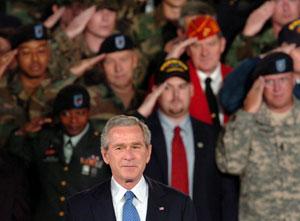War with Iraq!!!!!!In challenging war's critics, administration tinkers with truth

By James Kuhnhenn and Jonathan S. Landay
Knight Ridder Newspapers
WASHINGTON — WASHINGTON _ President Bush called Democratic critics of how he sold the Iraq war to the world "irresponsible" five times Thursday during a brief news conference in South Korea.
Bush said he agreed with Vice President Dick Cheney, who on Wednesday had accused some unnamed senators who oppose the administration's Iraq war policy of lacking "backbone" and making "reprehensible charges" that Bush and his aides "purposely misled the American people on prewar intelligence."
Cheney's rough-edged remarks, and the president's unequivocal endorsement of them, were the latest in the Bush administration's new campaign to challenge critics of how it sold the war, accusing them of twisting the historical record about how and why the war was launched. Yet in accusing Iraq-war critics of "rewriting history," Bush, Cheney and other senior administration officials are tinkering with the truth themselves.
The administration's overarching premise is beyond dispute: Administration officials, Democratic and Republican lawmakers and even leaders of foreign governments believed intelligence assessments that Iraq had weapons of mass destruction. That intelligence turned out to be wrong.
But Bush, Cheney, and other senior officials have added several other arguments in recent days that distort the factual record. Below, Knight Ridder addresses the administration's main assertions:
ASSERTION: In a Veterans Day speech last Friday, Bush said that Iraq war "critics are fully aware that a bipartisan Senate investigation found no evidence of political pressure to change the intelligence community's judgments related to Iraq's weapons programs."
CONTEXT: Bush is correct in saying that a commission he appointed, chaired by Judge Laurence Silberman and former Sen. Charles Robb, D-Va., found no evidence of "politicization" of the intelligence community's assessments concerning Iraq's reported weapons of mass destruction programs.
But neither that report nor others looked at how the White House characterized the intelligence it had when selling its plan for war to the world and whether administration officials exaggerated the threat. That's supposed to be the topic of a second phase of study by the Senate Select Committee on Intelligence.
"Our executive order did not direct us to deal with the use of intelligence by policymakers, and all of us were agreed that was not part of our inquiry," Silberman said when he released the panel's findings in March.
The Senate committee concluded that none of the intelligence analysts it interviewed said they were pressured to change their conclusions on weapons of mass destruction or on Iraq's links to terrorism.
But the committee's findings were hardly bipartisan. Committee Democrats said in additional comments to the panel's July 2004 report that U.S. intelligence agencies produced analyses and the key prewar assessment of Iraq's illicit weapons in "a highly pressurized climate."
And the committee found that after the Sept. 11, 2001, attacks, analysts were under pressure to avoid missing credible threats, and as a result they were "bold and assertive" in making terrorist links.
In a July 2003 report, a CIA review panel found that agency analysts were subjected to "steady and heavy" requests from administration officials for evidence of links between Iraq and al-Qaida, which created "significant pressure on the Intelligence Community to find evidence that supported a connection."
ASSERTION: In his speech, Bush noted that "more than a hundred Democrats in the House and the Senate - who had access to the same intelligence - voted to support removing Saddam Hussein from power."
CONTEXT: This isn't true.
The Congress didn't have access to the President's Daily Brief, a top-secret compendium of intelligence on the most pressing national security issues that was sent to the president every morning by former CIA Director George Tenet.
As for prewar intelligence on Iraq, senior administration officials had access to other information and sources that weren't available to lawmakers.
Cheney and his aides visited the CIA and other intelligence agencies to view raw intelligence reports, received briefings and engaged in highly unusual give-and-take sessions with analysts.
Moreover, officials in the White House and the Pentagon received information directly from the Iraqi National Congress (INC), an exile group, circumventing U.S. intelligence agencies, which greatly distrusted the organization.
The INC's information came from Iraqi defectors who claimed that Iraq was hiding chemical, biological and nuclear weapons programs, had mobile biological-warfare facilities and was training Islamic radicals in assassinations, bombings and hijackings.
The White House emphasized these claims in making its case for war, even though the defectors had shown fabrication or deception in lie-detector tests or had been rejected as unreliable by U.S. intelligence professionals.
All of the exiles' claims turned out to be bogus or remain unproven. >>>CONT




0 Comments:
Post a Comment
<< Home